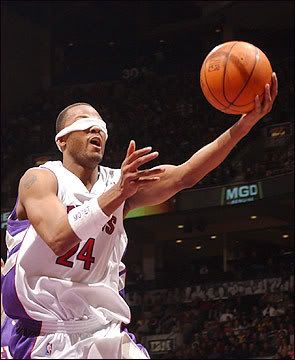 Tonight at the Meadowlands, not far from the Jersey swamp that Vince Carter is dragging his team into, your Toronto Raptors (15-19) play the New Jersey Nets (14-19) in a battle for first place in the NBA's Titanic Division.
Tonight at the Meadowlands, not far from the Jersey swamp that Vince Carter is dragging his team into, your Toronto Raptors (15-19) play the New Jersey Nets (14-19) in a battle for first place in the NBA's Titanic Division.Far from being scoffed at, such mediocrity should almost be celebrated. Most people cherish mediocrity more than they care to admit, at least out loud. For 95 percent of us, life is about being in denial into you come to terms with your own okayness (couching it in terms of "inner peace," of course). Just look around. No one really wants to better themselves these days, and those who are usually get scorned for it. I laugh at that wad who reads Samuel P. Huntington while he's on the stationary bike and listening to some indie band I haven't even heard of on his iPod.
Mediocrity abounds. How else do you explain why Oprah Winfrey has built a billion-dollar empire by validating the opinions of idiots? If people truly wanted to be better, they wouldn't turn to Oprah for advice, they'd go out and live.
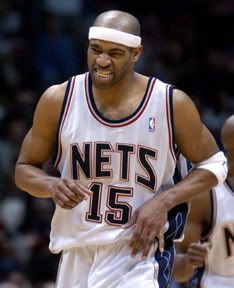 Pro sports tries to cover this up quest to be mediocre with safeguards like the unbalanced, divisional game-heavy schedules teams play in baseball and hockey. The National Football League has parity scheduling and a salary cap which makes it possible for teams go from 5-11 to 11-5 every year, giving everyone hope, except for the Detroit Lions.
Pro sports tries to cover this up quest to be mediocre with safeguards like the unbalanced, divisional game-heavy schedules teams play in baseball and hockey. The National Football League has parity scheduling and a salary cap which makes it possible for teams go from 5-11 to 11-5 every year, giving everyone hope, except for the Detroit Lions.That's not the case in the NBA, where a team plays everyone in its conference four times a season, thus making divisions irrelevant except for that Top-4 playoff seed that comes with finishing first. It might seem ridiculous to some uptight people, but it's honest. Of course, what can be more ridiculous in this day and age than being honest?
Don't listen to The Man and the line of BS that you have to be good in sports to win something. Why shouldn't sports be more like life, where you can be downright dreadful much of the time and still be a success, not unlike your boss at work and almost everyone who was in your residence floor back in your first year of university?
So in tribute to the Raptors and Nets and their combined .433 winning percentage, here's a Top 5 of pro sports' worst first-place teams.
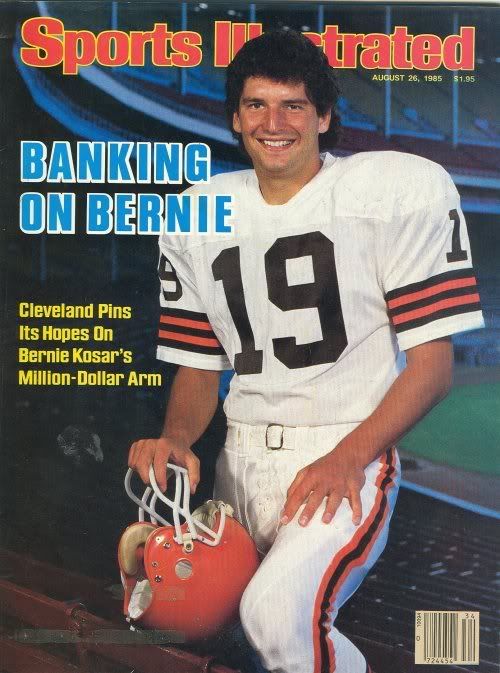 NFL: '85 CLEVELAND BROWNS (8-8 record)
NFL: '85 CLEVELAND BROWNS (8-8 record)In '85, the AFC Central standings were much funnier than North America's favourite wacky neighbour, Skippy Handleman on Family Ties; there wasn't a team in this division with a record you could sell at a flea market.
In Week 10, the Browns lost to Cincinnati and fell to 4-6. However, Bernie Kosar and the boys won four of their next five games, and that was enough to beat out the bungling Bengals and Pittsburgh Steelers for the division crown. While the Browns celebrated becoming the first and still only 8-8 division champion in NFL history, the Denver Broncos missed out on a wild-card spot with an 11-5 record. (John Elway would extract payback for this in later seasons. Karma can be a real bitch, you know.)
Everyone knows how the guys from the 1972 Miami Dolphins pop open the champagne every fall when the NFL 's last unbeaten team goes down. There's no word on whether members of the '85 Browns got together for a toast on New Year's Eve after the Seattle Seahawks won their final game and avoided becoming the NFL's second 8-8 division champ.
CFL: '80 HAMILTON TIGER-CATS (8-7-1)
When the Tabbies made it to Grey Cup 1980, because well, someone had to represent the East, it was over before most of Canada could even get drunk -- they lost 48-10 to Edmonton.
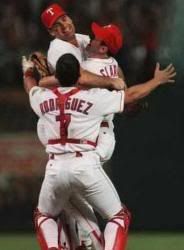 BASEBALL: '94 TEXAS RANGERS (52-62)
BASEBALL: '94 TEXAS RANGERS (52-62)
The start of the O.J. trial notwithstanding, the summer of nineteen ninety-four seemed like a pretty innocent time. I was 17 and not so beaten down by life, and and no cameramen were harmed in the making of Kenny Rogers' perfect game for the Texas Rangers on July 28.
 BASEBALL: '94 TEXAS RANGERS (52-62)
BASEBALL: '94 TEXAS RANGERS (52-62)The start of the O.J. trial notwithstanding, the summer of nineteen ninety-four seemed like a pretty innocent time. I was 17 and not so beaten down by life, and and no cameramen were harmed in the making of Kenny Rogers' perfect game for the Texas Rangers on July 28.
Such sweetness, of course, can't last. What would have happened if that '94 season had not been interrupted in mid-August by a players' strike? Would Matt Williams have broken Roger Maris' home-run record? Would the Expos have won the World Series? Would Tony Gwynn have hit .400?
And would the Rangers have become the first division champion in baseball history with a losing record? They were on pace to, thanks to their usual combination of strong offence and horrid pitching, which saw them go through 22 pitchers in little more than half a season.
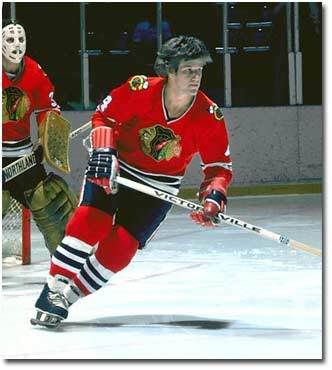 NHL: '78-79 CHICAGO BLACKHAWKS (.456 winning percentage)
NHL: '78-79 CHICAGO BLACKHAWKS (.456 winning percentage)
By the late '70s, pop music had become unlistenable, there was unrest in the Middle East and the NHL was majorly messed up -- so much different from today, of course. The NHL-WHA wars had littered the North American sportscape with the burned-out husks of failed hockey teams with ugly uniforms, and some of the survivors were looking none too good. The '78-79 Hawks were a pretty good case study in this, since they were a weird amalgam of over-the-hill Hall of Famers -- Tony Esposito, Stan Mikita and for six games, Bobby Orr on no knees before he was finally forced to retire -- and guys who would become pretty good later on, such as current San Jose Sharks GM Doug Wilson.
The Smythe Division was so bad that even with their losing record, the Hawks still finished first by 10 points. Now here's the weird part. Under the NHL playoff format at the time, the Hawks were seeded 11th out of 12 teams, but received a bye to the second round by virtue of "winning" their division. The extra rest didn't help, since they were pounded in four straight by the New York Islanders -- part of what became a NHL-record 16-game post-season losing streak.
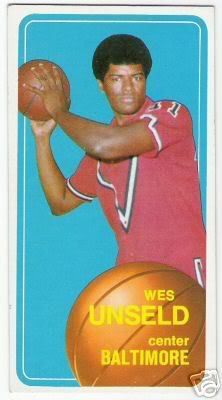 NBA: '70-71 BALTIMORE BULLETS (42-40)
NBA: '70-71 BALTIMORE BULLETS (42-40)
Why the Bullets and not the '56-57 St. Louis Hawks, who actually finished first in their division with a sub-.500 record? Well, that occurred in an eight-team league whose best team won only 61 percent of its games. The Hawks weren't bad -- it was just damn impossible for a visiting team to win in the NBA of the '50s.
In '70-71, the NBA added three expansion teams, which should have inflated the records of established teams like the Bullets, led by future Hall of Famers Wes Unseld (pictured) and Earl 'The Pearl' Monroe, the latter of whom Spike Lee later paid homage to in He's Got Game. Whatever the reason, it didn't raise the Bullets' boat one bit; they won eight fewer games than they had in '69-70.
And would the Rangers have become the first division champion in baseball history with a losing record? They were on pace to, thanks to their usual combination of strong offence and horrid pitching, which saw them go through 22 pitchers in little more than half a season.
 NHL: '78-79 CHICAGO BLACKHAWKS (.456 winning percentage)
NHL: '78-79 CHICAGO BLACKHAWKS (.456 winning percentage)By the late '70s, pop music had become unlistenable, there was unrest in the Middle East and the NHL was majorly messed up -- so much different from today, of course. The NHL-WHA wars had littered the North American sportscape with the burned-out husks of failed hockey teams with ugly uniforms, and some of the survivors were looking none too good. The '78-79 Hawks were a pretty good case study in this, since they were a weird amalgam of over-the-hill Hall of Famers -- Tony Esposito, Stan Mikita and for six games, Bobby Orr on no knees before he was finally forced to retire -- and guys who would become pretty good later on, such as current San Jose Sharks GM Doug Wilson.
The Smythe Division was so bad that even with their losing record, the Hawks still finished first by 10 points. Now here's the weird part. Under the NHL playoff format at the time, the Hawks were seeded 11th out of 12 teams, but received a bye to the second round by virtue of "winning" their division. The extra rest didn't help, since they were pounded in four straight by the New York Islanders -- part of what became a NHL-record 16-game post-season losing streak.
 NBA: '70-71 BALTIMORE BULLETS (42-40)
NBA: '70-71 BALTIMORE BULLETS (42-40)Why the Bullets and not the '56-57 St. Louis Hawks, who actually finished first in their division with a sub-.500 record? Well, that occurred in an eight-team league whose best team won only 61 percent of its games. The Hawks weren't bad -- it was just damn impossible for a visiting team to win in the NBA of the '50s.
In '70-71, the NBA added three expansion teams, which should have inflated the records of established teams like the Bullets, led by future Hall of Famers Wes Unseld (pictured) and Earl 'The Pearl' Monroe, the latter of whom Spike Lee later paid homage to in He's Got Game. Whatever the reason, it didn't raise the Bullets' boat one bit; they won eight fewer games than they had in '69-70.
Not that it mattered, since the NBA in its infinite wisdom had decided to give playoff spots to the top two teams in each of its four divisions, meaning the 42-win Bullets and 36-win Atlanta Hawks qualified out of the Central Division while the 44-win Boston Celtics missed out.
Bullets teams with better records had come up short in previous post-seasons, but this edition outlasted the 76ers and the New York Knicks, both in seven games, to reach the NBA Finals. Alas, they were easy pickings for Kareem Abdul-Jabbar's Milwaukee Bucks, who won in four straight.
Bullets teams with better records had come up short in previous post-seasons, but this edition outlasted the 76ers and the New York Knicks, both in seven games, to reach the NBA Finals. Alas, they were easy pickings for Kareem Abdul-Jabbar's Milwaukee Bucks, who won in four straight.
Hey, if the Raptors could make the Finals this year and get wiped out in four straight, their fans would consider that a pretty good deal.
That's all for now. Send your thoughts to neatesager@yahoo.ca.






No comments:
Post a Comment